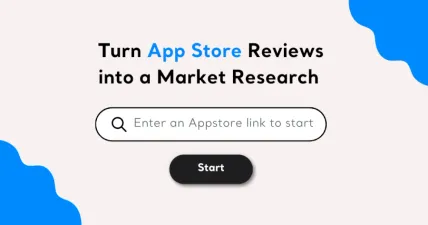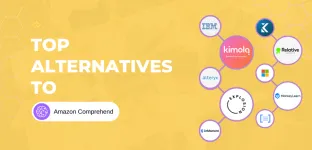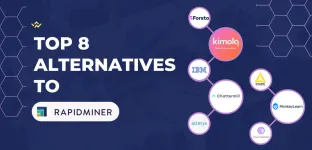Top 6 MonkeyLearn Alternatives & Competitors
Mar 03, 2026 - 12 minute read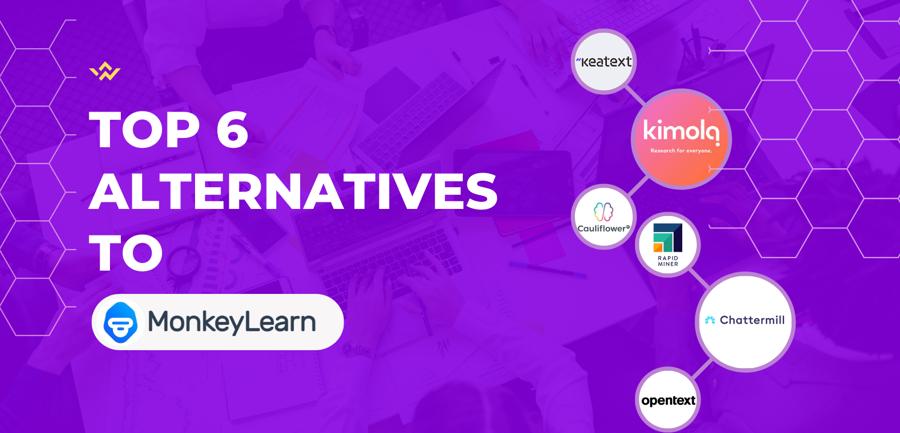
Over 5,000 years ago, the human race started “writing” to communicate their very complex needs and primitive desires. Naming, counting and “leaving their presence” after death were some of the most crucial things that made them find how to write.
Humans started talking about their needs 5,000 years ago in Mesopotamia, and they are still communicating their needs -maybe not on tablets but on channels they can share. They are not just sharing their needs but also what they have seen, where they were, their experiences, and what they eat or drink. They are now talking about anything and everything, and there is too much information out there than needed. Fun fact: As many as 23 billion texts are thought to be sent worldwide daily, 270,000 texts every second.
It was always been a challenge to understand what people are saying; in ancient times, it was hard to read, and all of those writings are very important to understand how civilization and culture have developed. But today, the human race produces too much content, and let’s confess that most of the content is not very useful, so they need to be cleaned and analyzed.
From my point of view, text analysis softwares are the modern palaeographers, maybe their mission is not very beneficial for the world heritage and culture, but they are the best way to understand needs of humans.
On this blog post, I’d like to introduce 6 alternatives for one of the most popular text analysis softwares, MonkeyLearn and talk about 5 things:
- Pricing Strategies
- Features
- Customer reviews
- Which markets they are working for
- Pros and cons
What is MonkeyLearn?
MonkeyLearn is a text analysis platform to analyze and classify texts. Founded in 2015, Monkeylearn is based on San Francisco (if they haven’t still moved even after the pandemic!)
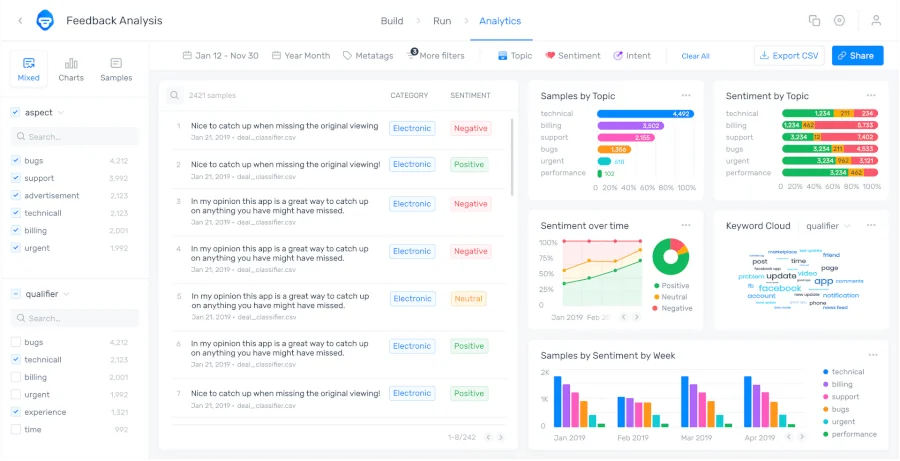
The key features of MonkeyLern are keyword extraction, topic detection, custom models, and ofcourse -sentiment analysis. Beyond that, MonkeyLearn is known with “Extractors” like “E-mail Extractor” or “Phone Number Extractor” and most of the website traffic of MonkeyLearn is generated by their “Wordcloud” page. Even though these features are important, I must say that MonkeyLearn is not the most fast & furious text analysis company in the sector; they haven't released a new feature in a year or two, and they are not tweeting since 2022 July.
If you think that it’s time to find an alternative to MonkeyLearn, I can assure you that you’re in the best hands.
TOP 6 Alternatives to MonkeyLearn
1-Kimola (sign up for free, no credit cards required!)
2- Chattermill (Sign up free but you can’t analyze a single data in free trial)
3- KeaText
4- OpenText Magellan
5- RapidMiner
6- Cauliflower
1- MonkeyLearn vs. Kimola
Kimola is a customer feedback analysis tool that enables research for everyone. Comparing to MonkeyLearn, Kimola can scrape data from various channels like Amazon, Trustpilot, Yelp, Etsy, analyze and classify the data in minutes and offers GPT integration to turn customer feedback analysis to generate executive summary, generate product descriptions or even social media themes, based on your customer feedback. I don’t want to brag about it as I’m also the COO of the company but hey, there are no other platforms like Kimola who integrated GPT to change the usability of customer feedback right now.
Here is a list of what you can achieve with Kimola
- Scrape reviews using the free browser extension
- Create custom models by dragging and dropping and train AI
- Classify and analyze customer feedback using pre-built classifiers (there is a large gallery for each business!)
- Conduct sentiment analysis
- View the NPS score
- Create customer journey reports
- Extract popular terms and topics from reviews
- Search through customer reviews
- Create marketing materials based on customer reviews with GPT integration
Compared to MonkeyLearn, Kimola is definitely a better alternative as MonkeyLearn does not enable its users to scrape any reviews from any channel, Kimola offers API just like MonkeyLearn, gives live video support, and has a great onboarding. Besides, Kimola makes you feel understood as a marketing or research person.
Furthermore, Kimola empowers users to create a variety of marketing materials, including SWOT analysis, product descriptions, and social media themes, all based on customer reviews. Kimola offers an excellent user experience at a great value for money. See all features and compare MonkeyLearn to Kimola here.
View results from Kimola that can create marketing materials based on customer feedback.
Kimola Pricing
- Free plan (no credit card required)
- Basic plan: $49 / month
- Standard plan: $179 / month,
- Business plan: $359 / month
- Enterprise plans available for Larger Companies
See all plans & features of Kimola
Kimola Reviews
Kimola has gained 5 tacos from each review on Appsumo.
👍 Pros
Kimola is fantastic. The overall tool works great, the pre-built models are great, and I love the little monster. Where Kimola blows the competition out of the water, however, is when you look at the entire package. What is the hardest part about running data through models? Collecting and formatting the data. Hands down, that is the biggest roadblock. But the Airset Generator- the scraper- makes this truly painless as it grabs the exact data you want and performs it for you. So you get Top Notch AI/ML models AND a way to use them seamlessly...legit superpowers.
BTW-I have a ton of scraping tools and can collect my own data, but it always adds more and more steps to the process as I need to grab the data, clean the data, and then upload the data-and; cleaning can take forever sometimes-but with Kimola I grab the data and analyze it.
👎 Cons
The only con was their limits but they increased them! They have also been alive since 2014. I think this is genuinely a superior alternative now and can see it going places focused on good UI/UX
For those who want to analyze customer feedback, Kimola offers a free trial period of 7 days. Moreover, in case you don't have any customer reviews available, Kimola's Github provides sample reviews that you can use as free datasets.
Schedule a demo with one of Kimola’s experts, or sign up for free right away.
2- MonkeyLearn vs. Chattermill
Chattermill is a customer insights platform that integrates data from conversations, support tickets, and customer feedback and analyzes it using machine learning to help organizations make sense of their customer experience.
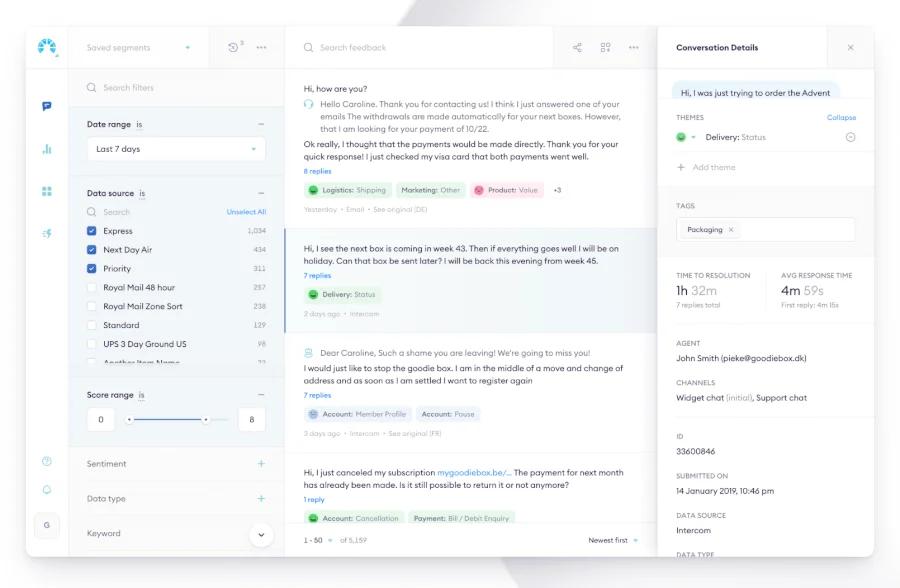
Compared to MonkeyLearn, Chattermill offers a better UI and it is closer to the marketing community than MonkeyLearn.
However, Chattermill has 3 downsides according to its users:
1- Interpretation of sentiment is not super clear.
2- Lack of report personalisation
3- Tagging is wrong; includes other unrelated themes.
4- No idea on pricing as Chattermill is not providing any plans online.
Chattermill Pricing
Unfortunately, Chattermill doesn’t provide any plans and pricing on their website, which is not the best way to get users.
Chattermill Reviews
👍 Pros
“The best part about Chattermill is the ability to really drill down into what your customers are saying. The way my company has set up the tool means we have various sources of feedback from a widget to actual surveys & ratings and it's really easy to filter out areas you're not interested in and create custom reports. I not only used it for my day to day job to understand how our customers feel about certain topics that relate to my product area, but also recently was able to use it as part of the Hackathon to search by a specific term related to our project & the problem we were trying to solve.”
👎 Cons
“One downside of Chattermill is that at times the analysis will think that a word or phrase in a review is negative when it is actually positive. However, because of the wording, Chattermill reads it as a negative word/phrase. This can throw off some of the analysis of the owner's reviews, but it doesn't happen too often.”
3- MonkeyLearn vs. KeaText
Keatext is a platform for customer insights that synthesizes unstructured feedback data to generate insights and give you instant clarity on what your customers care about most.
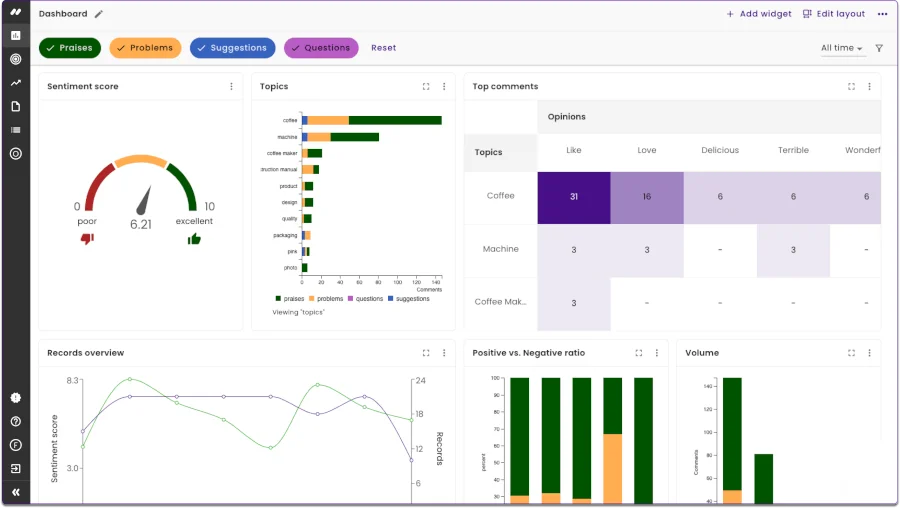
Compared to MonkeyLearn, Keatext is more expensive and unpopular. While MonkeyLearn stands out in the field of “Computer Software” on an industry basis, KeaText is at the forefront of the market research industry.
However, Chattermill has 3 downsides according to it’s users:
1- It's not easy to correct groupings of themes.
2- Difficult to use and less intuitive.
3- Reporting and tagging systems are insufficient for the user's needs.
Kaetext Pricing
Basic: $550 for 10.000 reviews
Pro: $999 for 20.000 reviews
Enterprise: $1650 monthly for 30.000 and up reviews
Keatext Reviews
👍 Pros
“We used Keatext for an analysis of a high volume of app store reviews. With a condensed timeline, we were able to easily see groupings of themes and understand relationships by digging into the individual data and correlations. The dashboard gave us different ways to slice the data for analysis and determine where to focus our recommendations and further exploration. The onboarding was thorough and very accommodating to our specific needs, and we appreciated the excellent customer service experience throughout the term of the project.”
👎 Cons
“Some areas within the tool are a little clunky or less intuitive than I might prefer. Some additional overall/macro-level analyses would be helpful.”
4- MonkeyLearn vs. OpenText Magellan
OpenText is the leader in enterprise information management. It is an artificial intelligence platform that provides machine-assisted decision making and business optimization to manage and analyze big data and content.
Compared to MonkeyLearn, OpenText Magellan offers more advanced features and is designed for large-scale data analysis. While MonkeyLearn is closer to marketing community, Magellan is closer with enterprise data analysis rather than customer feedback.
However, OpenText Magellan has 5 downsides according to it’s users:
1- Not very stable software, always conducting repairs.
2- Not specific. Resources are limited to learn on your own.
3- For those without practical experience in machine learning, it may not be sufficient.
4- Some deals get skipped because the pricing is too high.
OpenText Magellan Pricing
Unfortunately, OpenText Magellan doesn’t provide any plans and pricing on their website.
OpenText Magellan Reviews
👍 Pros
“The best thing personally I like the most is it has the capability of processing the structure and unstructured data seamlessly or sometimes Hybrid data structures. This product is a combination of Statistical Analysis, AI, ML, BigData Analytics as well as predictive analytics.”
👎 Cons
“It's a challenge to have Monkey Learn bucket support tickets into distinct user-readable buckets based on ticket text. Monkey Learn will create a huge amount of new buckets for the tickets, rather than fitting tickets into existing buckets. This is not helpful.”
5- MonkeyLearn vs. RapidMiner
RapidMiner is a data science platform founded in 2007. Organizations can create a machine learning model with a single tool. It aims to take the difficulty out of data science.Compared to MonkeyLearn, RapidMiner offers detailed usage for data mining but if you're into customer feedback analysis, MonkeyLearn is a better choice comparing to RapidMiner.
RapidMiner has 3 downsides according to its users:
1- It does not have user-friendly software.
2- The user interface does not have a modern design.
3- Due to the high memory demand of the tool, users complain that their computers overheat and slow down.
RapidMiner Pricing
Unfortunately, RapidMiner doesn’t provide any plans and pricing on their website.
RapidMiner Reviews
👍 Pros
“Implementing ML algorithms is a difficult business. Rapid Miner makes it easy to load your data, check your data for missing values, erroneous values, and correct them - and to implement both simple and advanced algorithms to understand your data better and to draw insights.”
👎 Cons
“It is not a simple and easy to use platform. It took multiple days, even weeks to learn how to use this tool effectively. It takes time to learn all the features for this tool as well. This tool is more for those who need to perform an extensive analysis for a dataset, rather than a simple one.”
6- MonkeyLearn vs. Cauliflower
Cauliflower offers AI technology that enables users to extract comprehensive and easy-to-understand insights from text. With their platform, users can conveniently merge various text fields by simply dragging and dropping them, customize filter variables using the dropdown feature, and utilize pre-existing variables such as language, weight, id, time, and location.
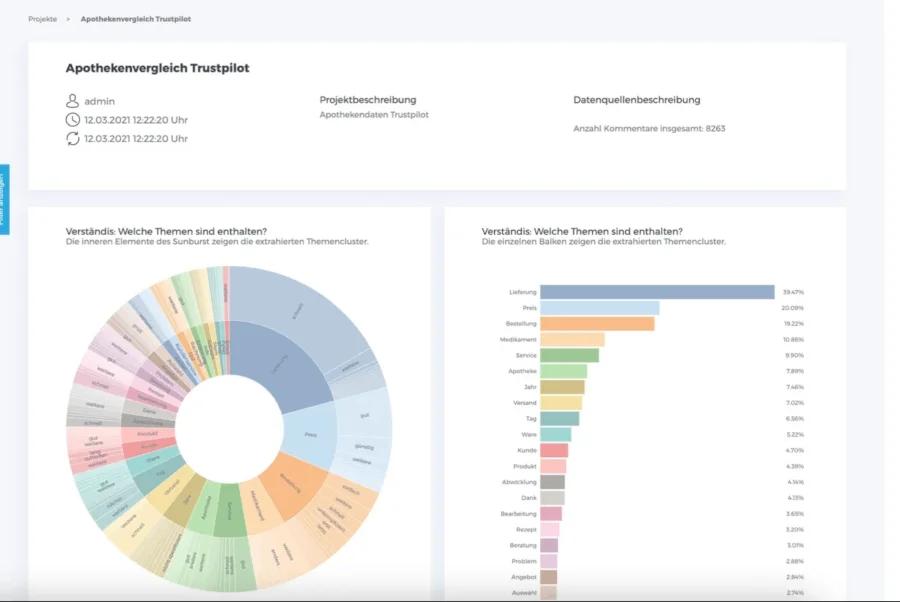
Compared to MonkeyLearn, Cauliflower is not very suitable for enterprises as it's dashboard, visualization is important for enterprises. But if you're trying to start your first data project, Cauliflower is good platform to start with. Cauliflower has 3 downsides according to it’s users:
1- The interface of this platform is difficult to use and time consuming.
2- Descriptions of functions are not in-depth, if you are a student you can use them for your final report :)
3- Working in the web interface is even more difficult and there are no more options allowing faster exchange of result.
Cauliflower Pricing
Unfortunately, Cauliflower doesn’t provide any plans and pricing on their website.
Cauliflower Reviews
👍 Pros
“In market research, open-ended questions are amazing to get unbiased and detailed feedback from participants. However, their analysis can take quite long and is prone to bias or inaccuracy. Cauliflower helps us save a lot of time by simplifying this analysis, identifying the most important topics, their relevance, and relationships. Beyond their the solution, the service at Cauliflower is outstanding as well”
👎 Cons
“It takes some time to get used to working with the codeplan, but they gus from Cauliflower have worked a lot on making it even more user friendly and always offer support when needed.”
